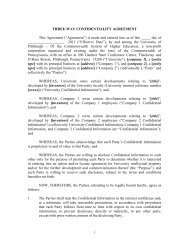IP Facts Sheets - Ownership - Innovation Commercialization
IP Facts Sheets - Ownership - Innovation Commercialization
IP Facts Sheets - Ownership - Innovation Commercialization
Create successful ePaper yourself
Turn your PDF publications into a flip-book with our unique Google optimized e-Paper software.
<strong>IP</strong><strong>Facts</strong><br />
University<br />
<strong>IP</strong> <strong>Ownership</strong><br />
of<br />
Issues<br />
Pittsburgh<br />
Series<br />
Answers to your intellectual property questions<br />
Q.<br />
A.<br />
How does the University determine who owns intellectual property that<br />
is developed by Pitt faculty, staff or students?<br />
The University has adopted two policies related to ownership of intellectual property: one for patent<br />
rights and the other for copyright. In general, the University claims ownership and control of<br />
all inventions, patents, patentable developments or related know-how developed by its faculty and<br />
students. Therefore, when an innovation is developed, the innovator must promptly submit an Invention<br />
Disclosure Statement to Pitt’s Office of Technology Management. Similarly, the University asserts<br />
ownership over certain kinds of copyright-protected intellectual property created by faculty and staff<br />
-- for instance, computer software developed at least in part on the University’s computer systems.<br />
Q.<br />
A.<br />
Q. A.<br />
When a Pitt faculty member writes a scholarly book, does the University<br />
have any right to the work?<br />
The University affirms that, except as specifically exempted, faculty and students are entitled to claim copyright<br />
ownership, including world-wide rights, in the following works authored by them: books; articles; educational<br />
coursework; similar works that are intended to disseminate the results of academic research or scholarly study;<br />
popular fiction or nonfiction works; poems, musical compositions; and other works of artistic imagination. If the<br />
copyrighted work was produced in the course of their University employment or under the supervision and control<br />
of the University as “works made for hire,” the copyrighted interests in such works automatically vest in the University.<br />
If a Pitt faculty member collaborates on research with faculty from<br />
another university, how is the ownership of the resulting innovation<br />
determined?<br />
<strong>Ownership</strong> is determined by the employment relationship of the innovators. Collaboration may result in intellectual<br />
property that is jointly owned by both of the collaborators’ employers. Pitt’s Office of Technology<br />
Management will cooperate with its counterpart at the collaborating institution on management of any jointly<br />
owned intellectual property. For example, Pitt has in place a Master Inter-Institutional Agreement with Carnegie<br />
Mellon University that provides a framework for cooperation in commercialization.<br />
Q. A.<br />
How does external research funding affect ownership of intellectual<br />
property developed at Pitt?<br />
Under the Bayh-Dole Act, the University is required to claim title in any invention conceived or reduced to practice<br />
at the University in the course of any federally funded research. The University asserts ownership over<br />
intellectual property developed by its faculty and staff, even when the research is funded by industry.<br />
This summary is presented by the University of Pittsburgh<br />
Office of Technology Management for informational<br />
purposes only. Please consult the University<br />
Policies document for specific information.<br />
1
Q. A.<br />
Q. A.<br />
<strong>IP</strong><strong>Facts</strong><br />
What intellectual property rights does the University offer to industry<br />
partners that sponsor research and development efforts by Pitt faculty?<br />
First, the University does recognize the pre-existing intellectual property rights of sponsors. It also offers to<br />
sponsors the right to negotiate a license to any new inventions that are developed under the Sponsored Research<br />
Agreement. However, to stay within the “safe-harbor” provisions of the Internal Revenue Service’s Rev. Proc.<br />
97-14 (which pertains to “private use” of tax-exempt bond-financed facilities), such licenses must be considered<br />
commercially reasonable, and the compensation must be determined at the time that the intellectual property is<br />
created. By retaining ownership, the University also ensures that a faculty member is not blocked from continuing<br />
to conduct research in a particular area.<br />
When Pitt researchers share tangible forms of intellectual property<br />
information, such as a newly developed cell line, with researchers<br />
from other institutions, does Pitt maintain rights in the material that is<br />
transferred?<br />
The University does assert ownership over such materials. By using a Material Transfer Agreement (a form<br />
that is available on the Office of Research Web site), the University’s rights in the material are preserved,<br />
including rights to any progeny or derivatives of the material being transferred. An MTA also assures that<br />
the recipient understands any limitations placed on the use of the material.<br />
Q. A.<br />
How much royalty income can Pitt innovators expect from innovations<br />
that are licensed by Pitt to industry?<br />
The inventors, as a group, will receive 30 percent of the net revenue received from any patent licensed by<br />
the University. The creators of copyrighted materials, as a group, will receive 50 percent of such net revenue.<br />
In both cases, keep in mind that license revenue<br />
will be used first to reimburse the University for any<br />
unreimbursed patent expenses and other expenses associated<br />
with the commercialization of the innovation.<br />
HOW TO REACH...<br />
Office of Technology Management<br />
412-648-2206<br />
www.otm.pitt.edu<br />
Office of Research<br />
412-624-7400<br />
www.pitt.edu/~offres<br />
2












